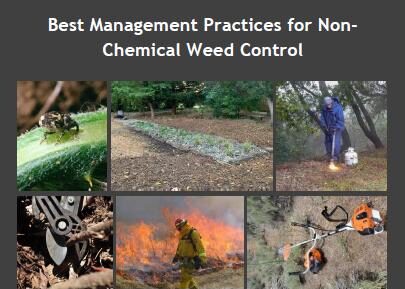
Anyone who has spent time dealing with weeds has probably gotten into heated debates with friends, colleagues, and maybe even foes about how best to get rid of these unwanted plants. Many have also had the rude awakening of seeing a weed thought long gone suddenly reappear. Can you relate?
Non-chemical weed control techniques, which are critical components of integrated pest management (IPM), fail more often than they should because they are used incorrectly: in the wrong way, at the wrong time, with the wrong amount, or for the wrong species. In order to help land managers manage weeds using the most effective and least toxic method, the California Department of Pesticide Regulation (DPR) funded a project though its Alliance Grant program with the California Invasive Plant Council (Cal-IPC) and the UC Statewide IPM Program.
The project resulted in a useful manual for land managers titled “Best Management Practices for Non- Chemical Weed Control”. This resource is now available for FREE download on the Cal-IPC website (www.cal-ipc.org/BMPnon-chem).
The manual consists of 21 chapters covering non- chemical methods and an additional 18 chapters for biocontrol agents, making it a rich IPM resource! In it, you will find:
- descriptions of IPM techniques;
- how, when, and how often to apply techniques to control weeds effectively;
- the types of plants and site conditions that each technique works well for (and those that it doesn’t); and
- hazards to be aware of for both applicators and the
Many experienced practitioners contributed to the manual as primary authors, reviewers, and additional contributors to make it a relevant and robust resource for users across the state.
A companion online decision support tool called Weed Control User Tool (WeedCUT) has just been released! The tool uses information from the BMP manual and helps users compare efficacy of different non-chemical options for specific weed targets and situations. The link to the FREE Online Decision Support Tool is weedcut.ipm.ucanr.edu. For more information about this project please contact Cal-IPC Science Program Director Jutta Burger, [email protected].
DPR’s Grants Programs promote research into and the adoption and implementation of effective IPM systems and reduced-risk pesticide use practices. For more information on DPR’s Grants Program and current or future grant opportunities, please visit https://www.cdpr.ca.gov/dprgrants.htm or contact John Gerlach, [email protected].
